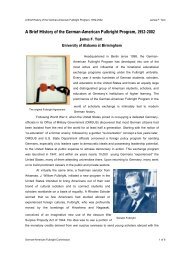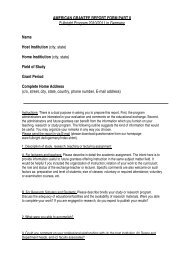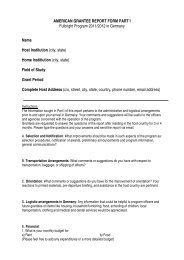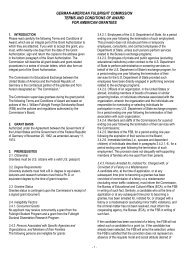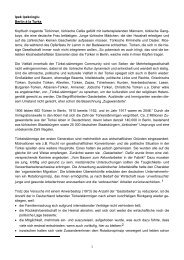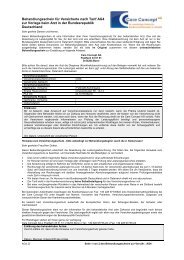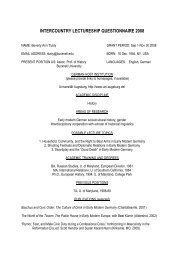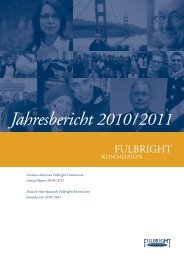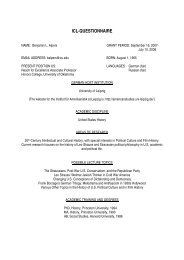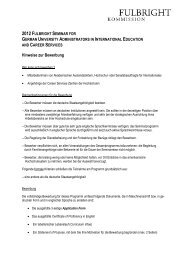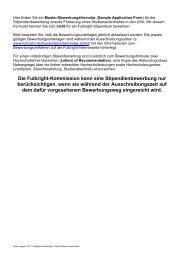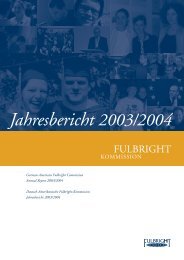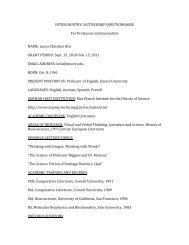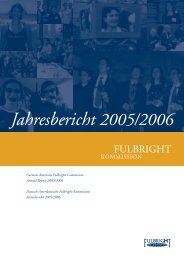The First Class of Fulbrighters - Fulbright-Kommission
The First Class of Fulbrighters - Fulbright-Kommission
The First Class of Fulbrighters - Fulbright-Kommission
You also want an ePaper? Increase the reach of your titles
YUMPU automatically turns print PDFs into web optimized ePapers that Google loves.
Contributing to the<br />
Next Generation<br />
by Don Ziegler<br />
ENJOYING LIFELONG GERMAN FRIEND-<br />
SHIPS extending into the third generation, promoting<br />
understanding <strong>of</strong> German and European history by generations<br />
<strong>of</strong> American students, helping achieve pr<strong>of</strong>essional<br />
fulfillment and scholarly production—these have been the<br />
major effects <strong>of</strong> the <strong>Fulbright</strong> experience on my life.<br />
When I arrived in Munich in the fall <strong>of</strong> 1953 I was<br />
lonely and ill-prepared to carry on extended conversations<br />
in German. Soon, it was my great good fortune to have<br />
been taken in by a family <strong>of</strong> refugees from East Prussia.<br />
<strong>The</strong>y needed my board and room money to make ends<br />
meet. I needed the understanding and nurture <strong>of</strong> a family<br />
setting, for I was desperately lonely for my wife and young<br />
daughter (having been notified about the <strong>Fulbright</strong> award<br />
so late in the summer, my wife felt unable to break her<br />
teaching contract). Although the family was headed by the<br />
father, a much-traveled engineer, the real force was a motherly,<br />
middle-aged woman, who eased my transition into<br />
German culture and taught me to speak the language “properly.”<br />
When good fortune brought my wife and daughter to<br />
Munich after the first <strong>of</strong> the year, my guest family insisted<br />
that we live with them in their five-room apartment (they<br />
also had a sixteen-year-old daughter). Years later, when I<br />
won an outstanding teaching award with a monetary<br />
stipend from the college where I taught, we brought the<br />
mother to visit us in America, a highlight <strong>of</strong> her life.<br />
Although she and her husband are now deceased, our family<br />
friendship continues through her daughter, now a grandmother<br />
living in Budapest with her Hungarian husband—<br />
whom we visited a couple years ago—and their two daughters<br />
in Germany, one <strong>of</strong> whom spent part <strong>of</strong> a summer with<br />
us in America.<br />
48 49<br />
After returning home from Munich in 1954 to take my<br />
doctorate, I based my dissertation on original research conducted<br />
in the Bavarian State Library. So impressed were<br />
members <strong>of</strong> my doctoral committee that they recommended<br />
publication by the university, which had the effect <strong>of</strong><br />
launching me on my pr<strong>of</strong>essional career. Other publications<br />
followed: a two-volume set <strong>of</strong> translated readings on 19th<br />
century Europe with my major pr<strong>of</strong>essor (I did most <strong>of</strong> the<br />
German translations) and a work on great debates <strong>of</strong> the<br />
Reformation.<br />
WHEN I BECAME A YOUNG HISTORY PRO-<br />
FESSOR at an undergraduate college, students were<br />
attracted to my lectures by experiences shared from my <strong>Fulbright</strong><br />
year along with related insights into the larger European<br />
historical context. More than a few went on to take<br />
graduate degrees in history. During the 1960s I took several<br />
student groups to Germany and countries behind the Iron<br />
Curtain in Eastern Europe, always concluding with free<br />
time for student travel and my return to Munich to visit<br />
old friends.<br />
Subsequently, I moved into academic administration,<br />
first to a deanship in Iowa, then as the chief academic <strong>of</strong>ficer<br />
<strong>of</strong> Doane College in Nebraska, the liberal arts college<br />
from which my wife and I had graduated twenty-five years<br />
previously. Among other accomplishments, I was able to<br />
help further the college’s growing reputation for achieving<br />
the most <strong>Fulbright</strong> scholars <strong>of</strong> any other higher education<br />
institution in Nebraska, including the state university.<br />
Today, seventeen years after my retirement, the number <strong>of</strong><br />
<strong><strong>Fulbright</strong>ers</strong> from Doane (mostly to Germany) approaches<br />
fifty. <strong>The</strong> <strong>Fulbright</strong> year was indeed a watershed experience<br />
in my life. It significantly broadened my understanding <strong>of</strong><br />
both Germany and Europe, providing insights that I sought<br />
to communicate to generations <strong>of</strong> American students.<br />
Don Ziegler received a B.A. from Doane College, Crete, Nebraska, in 1950 and an M.A. from the University <strong>of</strong> Nebraska in<br />
1952, before spending his <strong>Fulbright</strong> year in Munich. In 1956 he earned a Ph.D. from the University <strong>of</strong> Nebraska. He was an<br />
Assistant Pr<strong>of</strong>essor <strong>of</strong> History at Northern State College, Aberdeen, South Dakota (1954-56), Pr<strong>of</strong>essor <strong>of</strong> History at Carroll<br />
College, Waukesha, Wisconsin (1956-70), Pr<strong>of</strong>essor <strong>of</strong> History and Vice President <strong>of</strong> Academic Affairs at Iowa Wesleyan College,<br />
Mt. Pleasant, IA (1970-75) and held the same position at Doane College (1975-86). Ziegler’s publications include: Prelude<br />
to Democracy. A Study <strong>of</strong> Proportional Representation and the Heritage <strong>of</strong> Weimar Germany, 1871-1920; Europe in the<br />
Nineteenth Century, 1815-1914. A Documentary Analysis <strong>of</strong> Change and Conflict, co-authored with Eugene N. Anderson and<br />
Stanley J. Pincetl; Great Debates <strong>of</strong> the Reformation; A College on a Hill. Life At Doane, 1871-1987; and Doane College in<br />
Lincoln. <strong>The</strong> <strong>First</strong> Twenty Years.



